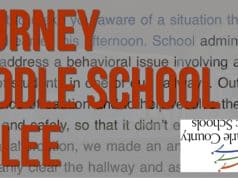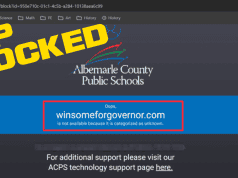by Hank Martin
 A “failed state” refers to a political entity that is unable to perform the basic functions and responsibilities of a sovereign, taxpayer-funded institution charged with service to the public, and the successful administration and service to the public from whom they receive financial support. Public School Systems in America therefore can be classified as either a successful or a failed state as they must provide certain functions. These functions include maintaining control, ensuring the security and safety of its students, upholding the rules and codes of conduct. The term “failed state” is often characterized by several key features:
A “failed state” refers to a political entity that is unable to perform the basic functions and responsibilities of a sovereign, taxpayer-funded institution charged with service to the public, and the successful administration and service to the public from whom they receive financial support. Public School Systems in America therefore can be classified as either a successful or a failed state as they must provide certain functions. These functions include maintaining control, ensuring the security and safety of its students, upholding the rules and codes of conduct. The term “failed state” is often characterized by several key features:
- Loss of Control: The school system loses the ability to exert effective control over its student body, faculty, and staff.
- Erosion of Authority: The ability to make decisions is significantly weakened. The school’s decisions are either ignored or actively resisted by large segments of the population.
- Inability to Provide Public Services: Basic educational services are no longer adequately provided. The public-school institution has become ineffective and corrupt, forcing those parents who are financially able to turn to alternative providers for these services, trapping all others in a no-win scenario.
- Personal Rights Violations: There is significant deterioration in individual student safety and security. This includes arbitrary assaults, sexual assaults, teacher injuries requiring medical attention, unwanted and inappropriate sexual exposure in bathrooms and locker rooms, etc.
- Scholastic Decline: Educational stability collapses. This decline often exacerbates social unrest and contributes to further instability. Learning is impaired when students are scared.
In a seemingly never-ending cycle of poor policy decisions and hubris, once again Albemarle County Public Schools (ACPS) trips over its own clay feet. ACPS recently has been embroiled in several controversies and issues that raise significant concerns about student safety under its current leadership and procedures.
Firstly, there is significant community dissatisfaction with the current Superintendent, Dr. Matthew Haas. Despite a petition with over 1,600 signatures calling for his removal due to various issues—including a shortage of bus drivers, poor communication, and a flawed school renaming process—the School Board chose to extend his contract. This decision was made in a closed session, adding to the community’s frustration and feeling of exclusion from the decision-making process.
Secondly, ACPS is dealing with overcrowding in certain schools, particularly in the northern feeder pattern. The School Board has approved a redistricting plan to address this issue by moving students to less crowded schools and planning for a new elementary school. However, the new school is not expected to open until the 2029-30 school year, leaving current overcrowding issues unresolved in the short-term. Overcrowded schools can lead to unsafe environments, as they strain resources and staff, making it more difficult to maintain safety and order.
Thirdly, ACPS has faced significant challenges in addressing the achievement gaps among students, as highlighted by a recent externally conducted audit. The report identified substantial disparities in student success across different demographics, which the community perceives as being inadequately addressed by the current administration. Such gaps not only impact educational outcomes but can also lead to environments where certain groups of students feel neglected or unsafe.
Fourthly, there has been ongoing tension between the School Board and the Albemarle Education Association (AEA), the union representing school employees. The recent approval of collective bargaining was a significant step, but it also highlighted underlying issues of dissatisfaction among teachers and staff regarding their working conditions and the administration’s handling of various issues. Unhappy and unsupported staff can contribute to a less stable and secure environment for students.
Fifthly, ACPS has recently implemented policies aimed at accommodating gender-expansive students, allowing them to use facilities such as bathrooms, locker rooms, and showers that align with their gender identity. While these policies are designed to promote inclusivity, they have sparked significant controversy and raised concerns about student safety and privacy.
The “Access in Alignment” policy permits students to use facilities that correspond with their gender identity consistently expressed at school. This policy ensures that students are not forced to use facilities that contradict their gender identity, even if that identity is fluid. To address privacy concerns, the “Privacy” mandate offers options such as single-occupancy restrooms or private changing areas, available upon request but not mandatory for all students. Additionally, the “Discomfort” mandate states that discomfort from sharing facilities with gender-expansive peers is not a valid reason to deny access to those peers. Instead, students uncomfortable with the new arrangements can request alternative accommodations.
Critics argue that these policies compromise the privacy and safety of all students. Allowing students to choose facilities based on gender identity, rather than biological sex, can create discomfort and potential safety risks, particularly for female students who may feel vulnerable in shared spaces with biological males. Instances from other districts, such as Loudoun County, highlight the potential for abuse of such policies. In one notable case, a male student identifying as female was involved in the assault of a female student in a bathroom, an incident initially covered-up by the school administration.
The response from the community and parents has been polarized. Many parents express deep concerns over their children’s safety and the potential psychological impact of these policies. They argue that while inclusivity is important, it should not come at the expense of other students’ rights to privacy and safety. The policies’ implementation without substantial parental notification or input has led to a feeling of distrust and helplessness among parents. The lack of clear communication from school officials about the presence of gender-expansive students in traditionally sex-segregated spaces has exacerbated these concerns. Albemarle County Public Schools’ gender-expansive policies aims to create an inclusive environment, they have also brought to the forefront serious concerns regarding student safety and privacy.
Lastly, but nowhere near the least, are the reports now surfacing that for quite some time, ACPS Transportation Department has utterly failed in its charge to comply with State and Federal requirements to drug test its school bus operators, ( Danger zone: Albemarle County Public Schools shuns Federal drug testing requirements for bus drivers Institutional arrogance begets extreme safety risk By Schilling Show – May 27, 2024)
To fully understand and comprehend the impact of this report, one must review and take into account a very basic setup that applies to all school districts in the United States.
Federal Funding and Compliance
School districts in the U.S. receive funding from federal, state, and local sources. Federal funds come from programs such as Title I (aimed at improving education for disadvantaged students), the Individuals with Disabilities Education Act (IDEA), and the Safe and Drug-Free Schools and Communities Act. These funds are contingent upon compliance with federal regulations and standards. Within that subset there is of course the issue of:
Transportation Funding.
Specific federal funds are allocated for transportation, including the safe and efficient transportation of students. This can and usually does include the purchase and maintenance of buses, as well as operational costs. Further, you have the Federal Requirements for Drug Testing Omnibus Transportation Employee Testing Act of 1991:
This Act mandates drug and alcohol testing for safety-sensitive transportation employees, including school bus drivers. It was enacted to ensure the safety of transportation systems. The Act requires pre-employment testing, random testing, reasonable suspicion testing, post-accident testing, return-to-duty testing, and follow-up testing for controlled substances and alcohol.
Department of Transportation (DOT) Regulations:
The DOT, through the Federal Motor Carrier Safety Administration (FMCSA), enforces drug and alcohol testing regulations (49 CFR Part 382) for commercial drivers, including school bus drivers. Compliance with these regulations is necessary for receiving certain types of federal funding, particularly those related to transportation and safety programs.
There-in we go to the next safety gate, the link between drug testing and Federal Funding. Compliance and Funding Eligibility:
School districts must demonstrate compliance with federal drug testing regulations to remain eligible for federal transportation funds. Non-compliance can result in the loss of these funds, which are critical for operating and maintaining school bus fleets. Federal audits and reviews of school district transportation programs often include checks for compliance with drug and alcohol testing requirements.
Next gate, Safety and Accountability:
Ensuring that bus drivers are free from drugs and alcohol is a key component of federal safety standards. The rationale is that drug and alcohol-free drivers reduce the risk of accidents and injuries, thereby promoting a safe environment for students. Federal funds are tied to performance metrics that include safety records and compliance with safety regulations, which include drug testing. States are responsible for implementing and enforcing federal drug testing requirements for school bus drivers. They often have additional regulations that mirror or enhance federal requirements. State education departments typically provide guidelines and oversight to ensure that school districts comply with these requirements.
The Kicker—Consequences of Non-Compliance:
School districts found to be non-compliant with federal drug testing regulations face penalties such as fines, increased oversight, and the potential loss of federal funds. Non-compliance can also lead to increased insurance premiums and potential liability issues in the event of an accident involving a school bus driver under the influence of drugs or alcohol. What this report illuminates, is not only a deficiency by the former director Charmane White, it also shows a deficiency and/or cover up or conspiracy by departments in both the Commonwealth of Virginia and within the Federal Government.
The connection between drug-testing of public-school bus drivers and federal funding for school districts is rooted in federal legislation aimed at ensuring safety in transportation. Compliance with these drug testing requirements is essential for school districts to receive and maintain federal funding, which supports various transportation-related needs. The enforcement of these regulations as devised and if enforced, promotes safety and accountability, thereby protecting students and ensuring the effective use of federal resources. The question that immediately comes to mind is simple: has the failure by the ACPS Transportation Department to comply with drug-testing caused either a decrease or perhaps a total elimination of federal and state funding, and does this lack of funding through compliance failure create the need for ever increasing taxes? We shall never know the truth; however, given regulations, it would explain much.
In summary, especially in light of this latest report concerning school bus drivers not being drug tested, the current leadership and procedures in Albemarle County Public Schools have led to a number of issues that put student safety at risk. From overcrowding and achievement gaps to poor communication and contentious relations with both school staff and community members, to rendering student safety, security and well-being null and void, these factors collectively create an environment where all three of these basic needs and characteristics have been compromised.
This community’s strong opposition to the superintendent’s contract extension further underscores the lack of confidence in the current leadership to effectively address critical and basic issues, and that opposition has proven itself to be warranted. The question now facing every parent, indeed, every tax payer, is simple, yet prescient. How much longer will this farce, this “failed state” be allowed to exist? The clock is ticking and there are indeed many lives in the balance.
No decision IS a decision. No action IS action. Any obfuscations otherwise will be as much in vain as Pontius Pilate’s theatrics of washing his hands. Tax payers are funding this madness and the blood is on all of our hands—but that’s what out-of-court settlements are for these days, I suppose.








